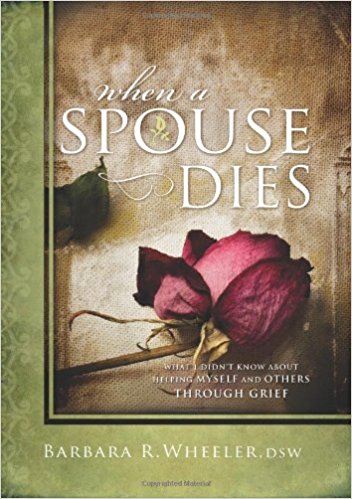“Loss has taught me that the death of a spouse or partner affects every aspect of the day.” — Barbara R. Wheeler, DSW
Barbara R. Wheeler, the author of this slim volume (so slim, I struggled to find it in the library’s hold section) spent her career teaching future clinical social workers. As a therapist myself, I chuckled when she quoted herself saying to her students “You don’t have to be a cow to know what milk is.”. She reiterates what all therapists know — that none of us can have life experience that covers the entire range of human pain, struggle, and sorrow. The death of her own husband awoke her to know loss, in a way she could not predict. His death taught her that losing a partner is a confusing, conflicting, and all-consuming experience.
Her husband Jim’s death changed her in ways she could not have predicted and thus, she gathered other widows’ stories to explore whether her experiences were typical — or not. She asked, “Other than becoming suddenly single, has losing your spouse or companion changed you as a person?”
Her chapters explore the pervasiveness of grief, how it pushes one to reflect on the intricacies of marriage and couple hood. She offers help for coping with loss and nudges widows to live into the future.
In her chapter on coping, Wheeler throws out an interesting challenge — to move yourself forward as you heal, help someone else.
“It is extremely challenging to help others when the weight of sorry is so heavy on yourself, but not impossible. The therapeutic value often outweighs the difficulty.” (p. 52).
As a therapist, my takeaway for how can I help others help themselves was Wheeler’s term, Cope Chest. Build yourself a Cope Chest by collecting strategies that work for YOU. For some, that would include talking with others, some their religious faith, for many spending time in nature. And at times, deliberate distraction may be just what’s needed. What works for one person, doesn’t work for the next — a good reminder for all therapists.
Wheeler begins her reflection on the future with “For starters, I came to learn the difference between ‘alive’ and ‘living’.” In the days and weeks following her husband’s death, she was unsure whether she even wanted a future without him but she noticed, after what she calls a considerably long time, she began making changes in her physical space, changing her home to be more a reflection of herself not of themselves, and realized that this project was symbolic of her moving forward. She — and I can see her smiling — also bought a red car.
She offers grace to those friends and family who seem to side-step conversations about her late husband. When interviewing other widows to learn if her own experience was unique or typical she learned that others had also experienced something similar. Usually conversations are reciprocal — that is, I comment about the weather and you respond about the weather. When talking about loss, however, conversations quickly veer off, leaving the mourner baffled. “Talking about a deceased companion and the emotional pain, as we know, is healing but ‘who do you talk to?’ the widow asks. ‘The subtle messages (some nonverbal) that I get are ‘we love you, are concerned about you, and want you to get better, but let’s not talk about it.’” (p. 61). Wheeler concludes that the reality of grief is grieving is a lonely place, full of contradictions both in ourselves and others.
For more on our need to connect with others when we’re grieving, see Searching for Community.
The subtitle includes helping both myself and others. The book concludes with the usual “Listen without giving advice” and “Be available”. However, as someone who is always looking for good questions, her “What would you like others to know about Jim?” question struck me as the most useful snippet in her Helping Others section. What widow wouldn’t love to answer that question and know that the asker genuinely wanted to know?
Reading this book, I wondered if at least one of our widow focus group had read it — as one of these women also spoke of doing hard things, using that exact phrase. She also spoke of choosing to live into her future with purpose.
When a Spouse Dies: What I didn’t know about Helping Myself and Others through Grief by Barbara R. Wheeler is, as I said above, a small book, written so the reader can pick it up, read a bit here and there, and put it down again — and most likely seeing herself on every page. The author does not discover anything new about grief and grieving but says, both of her own experience and others’ “Even the scars grief leaves are tolerable. I learned it is possible to survive — not only survive, but also to grow through loss. The impulse to grow is as strong as the impulse to survive. I know.”
Highly recommended.

